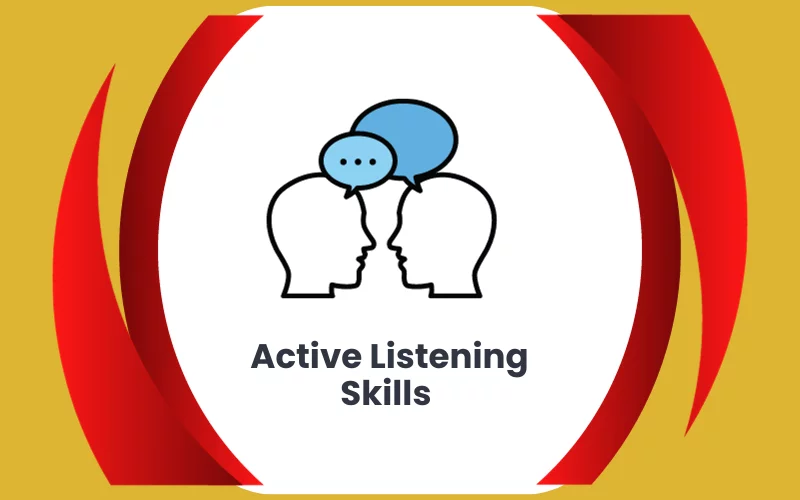The Power of Active Listening: How Lawyers Can Build Trust and Enhance Communication

Active listening is a crucial communication skill for lawyers, as it allows them to truly understand and connect with clients and team members, build trust, and foster a collaborative and supportive work environment.
Why Active Listening?
By actively listening, lawyers demonstrate their genuine interest in their clients and colleagues’ thoughts, feelings, and concerns, which in turn improves engagement, job satisfaction, and overall performance.
We all like to feel respected and appreciated. We want to feel that the other person is genuinely interested in what we have to say. Which is why active listening is so important.
In this Article, I’ll delve into the importance of active listening for lawyers and leaders and share practical tips for improving your active listening skills.
The Importance of Active Listening for Lawyers
-
Active Listening Builds Trust and Rapport:
Active listening helps lawyers establish trust and build connections with clients and team members by showing that they genuinely care about their thoughts, feelings, and concerns.
We all like to feel respected and appreciated. We want to feel that the other person is genuinely interested in what we have to say. Which is why active listening is so important. Think of a situation when you know the other person wasn’t really listening to you. It’s called “paying lip service,” and it makes us feel like we are not worth listening to.
-
Active Listening Enhances Communication:
By actively listening, lawyers can better understand their clients and colleagues’ perspectives, needs, and challenges, which enables them to communicate more effectively and provide better legal advice and support.
-
Active Listening Facilitates Problem Solving and Conflict Resolution:
Active listening helps lawyers quickly identify the root causes of problems and conflicts and make better recommendations to their team and clients.
-
Active Listening Encourages Employee Engagement and Job Satisfaction:
When lawyers actively listen to their colleagues and team members, they create an environment where employees feel valued, respected, and empowered to share their ideas and contribute to the organisation’s success.
-
Active listening Strengthens Leadership Skills:
Active listening is a foundational leadership skill that enhances a lawyer’s ability to influence, inspire, and motivate their clients, colleagues and team.
Tips for Developing Your Active Listening Skills as a Leader
-
Give Your Full Attention:
When engaging in a conversation, focus your attention on the speaker and avoid distractions. Put away your phone, maintain eye contact, and use body language, such as nodding or leaning forward, to show that you are fully engaged. Remember, communication is more than the spoken word.
-
Avoid Interrupting:
Allow the speaker to finish their thoughts before responding or asking questions. Do interrupt and ask for something to be rephrased or repeated if it’s important. Generally, it’s better not to interrupt but as a lawyer you need to get things clear. If you are wondering about what was said you will lose your focus. Interrupt, get clear and get focused.
-
Reflect and Clarify:
Paraphrase what the speaker has said to ensure that you have understood their message correctly. Ask clarifying questions if necessary, and provide feedback to demonstrate that you are actively processing the information.
-
Respond Empathetically:
Acknowledge the speaker’s emotions and show empathy and understanding by validating their feelings and expressing your support. Often, lawyers are so focused on getting the facts right and thinking of strategies they forget to acknowledge the human element.
-
Encourage Open Communication:
Foster an environment where your clients, colleagues and team members feel comfortable sharing their thoughts, feelings, and concerns. Provide opportunities for open dialogue and actively solicit feedback. It’s really important to develop connections. As AI becomes more sophisticated and takes over more of the routing legal work the only thing that will distinguish one lawyer from another is their people skills.
Conclusion
Developing your active listening skills as a lawyer is essential for building trust, improving communication, and fostering a collaborative and supportive work environment.
By actively listening to your clients, colleagues and team members, you’ll be better equipped to address their needs, concerns, and challenges, which in turn will lead to improved performance, better client engagement, and greater job satisfaction.
Start practising active listening today and unlock the full potential of your leadership and your team.
If you are ready to develop your active listening skills book a discovery call with Caryn and see how you can become a clear confident English speaker and feel less stressed and more in control when speaking English.
Generated with Pin Generator
⚡ The Influence Pack: Essential Frameworks for Fast Results
Tired of losing impact in English?
Learn how top international lawyers use structure and influence frameworks to win clients, negotiate confidently, and speak with control — **in just a few hours.**
- 📘 Essential Toolkit
- 🎯 Instant Results
- 💬 Designed for Legal Professionals
Enroll now for only £29.99
Start Now →Next step: The Clarity Accelerator — build the full system.
Secure payment • Instant lifetime access

